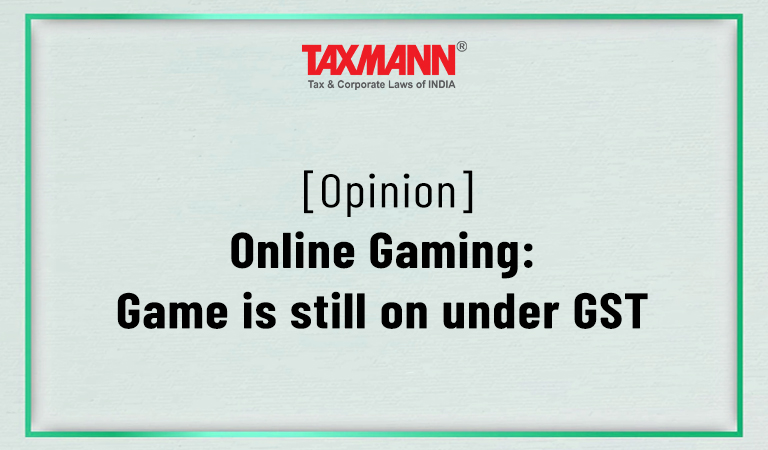[Opinion] Online Gaming: Game is still on under GST
- Blog|News|GST & Customs|
- 2 Min Read
- By Taxmann
- |
- Last Updated on 16 November, 2022

DS Mahajani – [2022] 144 taxmann.com 208 (Article)
Introduction
With advent of technology, availability of uninterrupted internet and smart mobile phones clubbed with series of lock-down during the recent pandemic gave early birth of Online Gaming industry India. Online Gaming is latest and youngest entry in the world of technology. Online Gaming is seen as disruptive market considering the size and scale across the world.
The market size of global Online Gaming estimated at USD 196 Billion in 2021 and is expected to reach USD 221 Billion in 2022. With CAGR of 13% from 2022 to 2030 the revenue of Online Gaming is expected to be USD 584 Mn by 2030.
India currently has more than 400 Gaming companies and 420 Million online gamers, second only to China. The Game users are projected to increase from 420 Million to 657 Million in 2025 – which is over 50% increase. The Indian online gaming industry is growing annually at 30% and is one of the fastest growing segments on digital media and entertainment sector.
In this growing sector, Dream11 (owned by Dream11 Fantasy Private Limited), Mobile Premier League and Games24x7 are three Gaming Unicorns of the Country. Dream11 is one of the most popular fantasy apps globally, with nearly 10 crore users on its platform.
Unlike other games/sports, online gaming does not have any regulatory framework in India. In absence of the same, Indian gaming Industry have made their self-regulating associations/bodies like Federation of Indian Fantasy Sports, Indian Federation of Sports Gaming, All India Gaming Federation, Online Rummy Federation and Federation of Electronic Sports Associations of India to name a few.
What is Online Game, and How does it Function?
Online games refer to games that are played over some form of computer network, most often the Internet. Online games can range from simple text-based games to games incorporating complex graphics and virtual worlds populated by many players simultaneously. There are variety of games from existing outdoor games like cricket, football, kabaddi, basketball and hockey etc to indoor games like Rummy played in a virtual mode – mostly on mobile phones. In India, after Rummy, Cricket is one of the most played online games, as Cricket is another religion of our Country. And Cricket is the main reason for making Online games more popular in India.
Under Online Gaming, the gaming company charge from the payer/participants an amount which has two elements – one Platform Fees or Entry Fee, which is about 15% to 20% of the amount collected. The balance amount collected from each player/participant is pooled in as Escrow Account which ultimately gets distributed amongst the players /participants as Prize Money or Pot Money immediately upon conclusion of the game.
Click Here To Read The Full Article
Disclaimer: The content/information published on the website is only for general information of the user and shall not be construed as legal advice. While the Taxmann has exercised reasonable efforts to ensure the veracity of information/content published, Taxmann shall be under no liability in any manner whatsoever for incorrect information, if any.

Taxmann Publications has a dedicated in-house Research & Editorial Team. This team consists of a team of Chartered Accountants, Company Secretaries, and Lawyers. This team works under the guidance and supervision of editor-in-chief Mr Rakesh Bhargava.
The Research and Editorial Team is responsible for developing reliable and accurate content for the readers. The team follows the six-sigma approach to achieve the benchmark of zero error in its publications and research platforms. The team ensures that the following publication guidelines are thoroughly followed while developing the content:
- The statutory material is obtained only from the authorized and reliable sources
- All the latest developments in the judicial and legislative fields are covered
- Prepare the analytical write-ups on current, controversial, and important issues to help the readers to understand the concept and its implications
- Every content published by Taxmann is complete, accurate and lucid
- All evidence-based statements are supported with proper reference to Section, Circular No., Notification No. or citations
- The golden rules of grammar, style and consistency are thoroughly followed
- Font and size that’s easy to read and remain consistent across all imprint and digital publications are applied



 CA | CS | CMA
CA | CS | CMA
